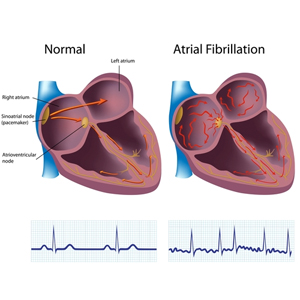 Researchers screened more than 13,000 Hong Kong citizens for atrial fibrillation using a smartphone-based, wireless, single-lead ECG, according to a study published yesterday in Heart.
Researchers screened more than 13,000 Hong Kong citizens for atrial fibrillation using a smartphone-based, wireless, single-lead ECG, according to a study published yesterday in Heart.
Afib can increase a person’s risk of heart failure and ischemic stroke, which can result in permanent neurological disability. Oral anticoagulation therapy can reduce the risk of ischemic stroke, but there is widespread under-treatment in patients with afib, according to an editorial published in the journal.
Patients can experience asymptomatic afib, which reduces the chance of recognition and diagnosis. There are not a lot of data from screening studies that can demonstrate the prevalence of “silent” afib.
Of the 13,000 volunteers, 0.8% had newly diagnosed afib, the majority of which was asymptomatic. The total prevalence among the volunteers was 8.5%. The researchers concluded that their screening method was an effective way to gather epidemiological data from the population regarding afib.
The team of researchers reported that they recruited the 13,000 through advertisements, although the editorial points out that the study is not clear what types of advertising was used. “Participation in systematic AF screening programs in Europe has been in the region of 50% when directed towards elderly persons, mostly above 65 years of age. This participation is lower than in most established screening programs,” they wrote.
The editorial offers some explanation as to why this is the case: People are reluctant to participate in a trial rather than an established procedure and the general lack of knowledge about afib among the public.
If a patient is screened and diagnosed with afib, the editorial suggests they get their stroke risk assessed to decide if oral anticoagulation therapy is necessary.
“Technological development has provided us with solutions for easily accessible and cost-effective ECG recordings. Hand-held one-lead ECG recorders have proved to be feasible for [afib] mass screening. Still, much more data on the optimal mode and duration of ECG recording are needed,” they wrote. “In order to relieve both patients and society from the consequences of untreated [afib], we believe and hope that [afib] screening in risk groups will be a part of the standard healthcare in many countries in the near future. Besides, isn’t it encouraging that we can use our smartphones to search for other things than Pokémons?”




